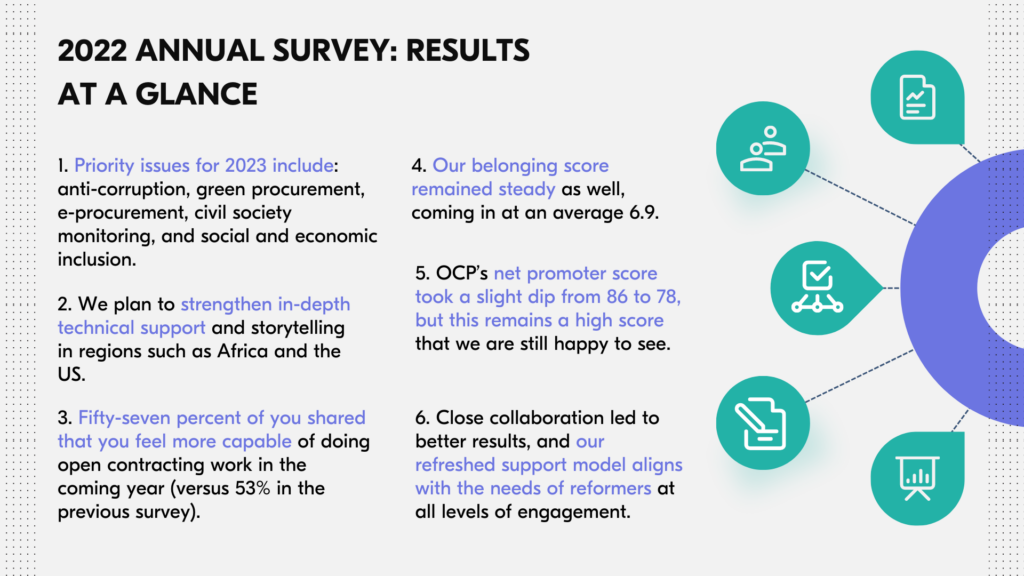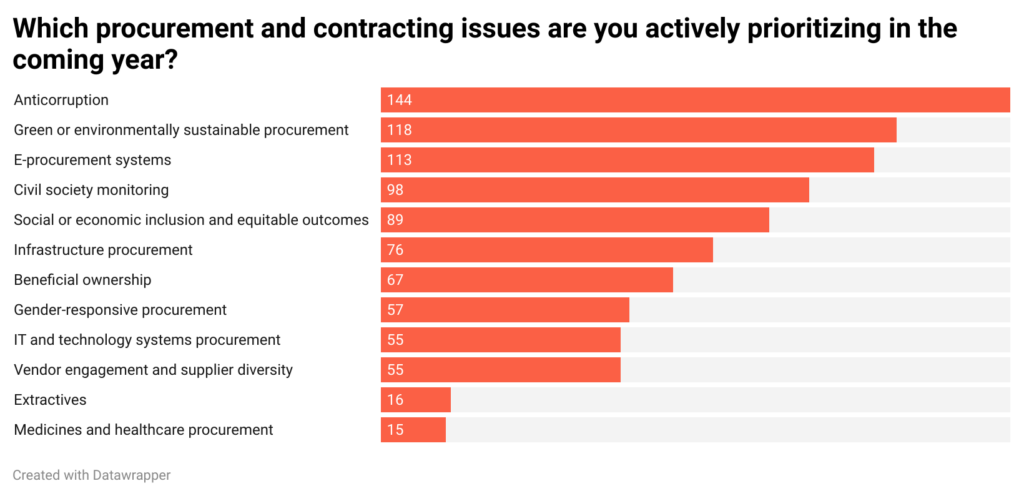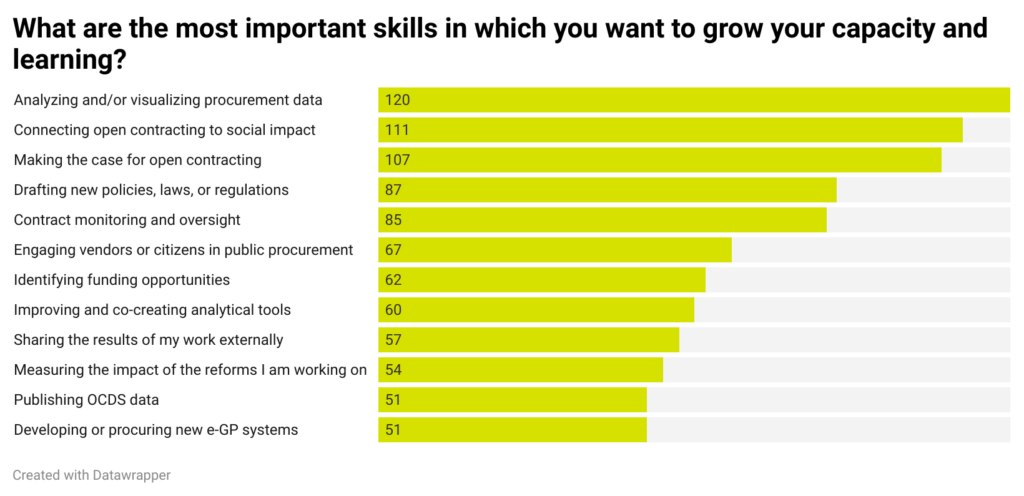Feedback on 2022: what you told us and what we are doing about it

We closed out 2022 pleased with the progress we made supporting partners around the world, but as ever, you get the last word. We had over 360 reformers from nearly 80 countries respond to our feedback survey at the end of the year. Here is what you told us, and what we will do about it.
We asked: How helpful is our support? You said: Progress is steady, but we can push for more in certain areas
Each year, some of the most important metrics we gather in the annual survey include our net promoter score, belonging score, capability score, and resource usefulness score. Together, these scores help us better understand how inclusive, responsive, and effective we are as an organization.
We saw some major changes during the pandemic years of 2020 and 2021. Our scores this year were more like the gradual improvements we saw in 2019 and before.
Our net promoter score is a good example: the score is based on the question “would you recommend working with OCP?”, and is calculated by taking the percentage of very positive responses (8 or more out of 10) and subtracting the percentage of respondents who are not as enthusiastic (5 or under). It shot up to 86 during the peak pandemic as our team worked around the clock to respond to the ongoing crisis. In 2022, we landed at a strong 78, more like our pre-COVID-19 numbers (e.g. in 2019 our net promoter score was 76) and overall still a very high rating.
We also saw small but positive steps forward in resource usefulness and capability. 68% of respondents said they found our resources very useful, and 57% of respondents said they felt more capable of doing open contracting work in the coming year.
We looked at the scores by region, too. Last year, we flagged that we wanted to invest in reaching our community in Africa better. So we are delighted to see our partners across the continent come out in force, with almost a quarter (23%) of total responses this year. Your feedback is telling us that we can boost our support there (where our support score was below other regions in which our projects are more advanced). Perhaps our longest engagement in Africa has been in Nigeria, and we are pleased to see that we scored strongly there.
So, what are we doing about it?
We are recruiting a new Senior Manager for our Africa team who can work side-by-side with partners across the continent and provide targeted technical assistance. If you are an awesome procurement reformer or open contracting champion based in Africa, please apply.
Our program and engagement is still new in the US and the scores also reflect that we can improve our support to partners there, especially around cities, where social challenges are huge and resources spread very thin. We will be making an extra effort to support US cities and other lower capacity environments to apply for our Lift impact accelerator program when it goes live towards the end of March. We are also excited that our two current US Lift projects in Des Moines, IA and El Paso, TX will serve as inspiring stories in 2023, helping others across the country make the case for reforms and provide a template to follow.
One additional area we want to address is our gender balance. Although we made an intentional push, we noted that more men than women responded to the survey. We got a better balance last year, so we didn’t push hard enough for equivalence this year and we own that mistake. The good news is that we’ve closed the gap on belonging and capability between men and women that we flagged from last year. This was a top priority for us, and we’ve improved! Scores were relatively equal and balanced across genders for support, capability, and belonging.

We asked: What’s the best way to engage partners? You said: Close collaboration is key
We are always reflecting on our strategy and the best tactics to achieve it. We asked some questions about that in our survey, as we wanted to explore how the intensity of our partner work affected your support and belonging scores. There was an extremely clear correlation between your perception of our level of engagement and your scores on our support. “High engagement” respondents, or those who scored this question between 8 and 10, gave us an incredibly strong net promoter score of 97 (much appreciated!). Also, 80% of high engagement respondents reported increased capabilities in open contracting, and shared an above-average sense of belonging (8.2 out of 10) and support (8.9 out of 10). We are humbled to help our close partners achieve impact.
What are we doing about it?
Firstly, this is great feedback for us as we plan our 2024+ strategy: fewer, deeper engagements are better than more numerous but shallow engagements.
And we are increasing the size and scale of our Lift impact accelerator cohort this year, which is one of our most intense investments. As mentioned, keep an eye out for the application launch in March!
More generally, we have been reflecting on this in our refreshed support model, which, based on Lift, will help our team prioritize high engagement projects through clear engagement criteria, a robust theory of change, and close collaboration to develop effective monitoring, evaluation and learning plans.
Of course, we will also work to strengthen our scores for low and medium engagement reformers, and we hope our new support model will help partners move up the ladder of our graded support, and offer more tailored, goal-driven implementation journeys that you can easily adapt.
We asked: What are your priorities in 2023? You said: Anti-corruption, sustainability and e-GP reform
When we asked in which skills and areas you most wanted to grow your capacity, we saw a continued demand to create real change through open contracting, with a host of social impact areas scoring over 30% of respondents.
At the top, with a relatively clear lead, was anti-corruption. This will remain a very important focus to us, especially as we are building new tools and improving our support journey there.
We were excited to see green and sustainable procurement come in at number 2, and e-GP at number 3. These seem like really important areas to drive transformational change, and we have our new OpenSPP and e-GP transformation research to furnish insight and tools to help you deliver! Economic inclusion and equity also saw notable growth 6 points up to 27%, breaking the Top 5 of priority topics for the first time.

What are we doing about it?
Anti-corruption, sustainability, and social inclusion will form our three Lift challenge questions for the coming year.
We were not surprised to see that monitoring, and data analysis and visualization also continue to be critical areas of support and growth for our partners. We know that this matters, and we will continue to help government and civil society actors leverage data and technology through our newly in-house data team and user-friendly data standard tools (which nearly 50% of you cited as one of the most useful OCP resources of 2022) too.

As always, we are grateful to you all for the time and care in your responses: we will be hard at work in 2023, turning your insights into better support for reformers who are tackling many of our biggest challenges through the power of procurement.